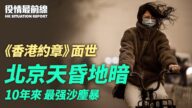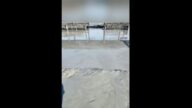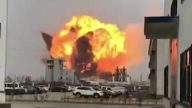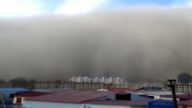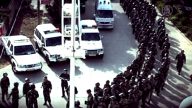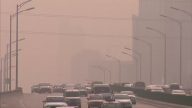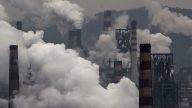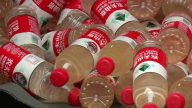【新唐人2014年02月12日訊】中國的自然環境惡化,催生出一個新群體——「環境移民」。當數以億計的農民背井離鄉進城尋找工作機會的同時,城市的新興階層卻選擇逃離大都市。但是,當今中國,隨處都有空氣污染,水污染,和食品污染,「癌症村」超過200個,能跑到哪裏去呢?哪一個地方稍微好一點呢?下面請看本臺記者秦雪的深入報導。
中國與全球化智庫(CCG)上個月22號在北京發佈的《國際人才藍皮書》指出,根據過去一年多所發生的移民情況,中國環境問題的加劇,成為精英和富裕階層移民的重要原因。
中國的「環境移民」兵分兩路,一個群體移向海外,去國外吸「純氧」,另一部分則依然留在中國。富裕的階層,選擇移民美國、加拿大、澳大利亞、和新西蘭等移民型國家,或其他環境宜人的歐洲小國。留在中國的「移民者」,則遷移到雲南大理、海南三亞、山東威海、或廣東珠海等環境宜居、人口總量相對較少的中小城市。
蘇州自古有「上有天堂下有蘇杭」的美譽。但是「蘇州中學」教師袁雪成表示,蘇州也經常出現霧霾天,嚴重的時候,外面霧濛濛一片。他表示,移民海外固然是許多中國人的嚮往,但是大多數人做不到。
蘇州中學教師袁雪成:「只有少部分人在城裡面賺了錢,他有這個條件了。到環境稍微好一點的地方,現在中國,你說哪一個地方稍微好一點?空氣污染,水污染,都有,包括食品污染,都有,你跑到哪裏去呢?條件好一點的到國外去,只有少數人才能到國外去。極少部分人。大部分人肯定還是跑不了的。」
山東濟南一名投資經理——余新永,多年來在治理污水的企業工作,他看到企業污染的亂象,表示,中國商人只把中國當成一個搾取金錢的地方,完全不顧及生態環境。而政府相關部門對待環境問題,不是用科學的人文理念去治理,而是應付。
山東濟南投資經理余新永:「所謂的應付是,第一,應付上級領導的指示。第二,應付突發的環境事件,比如太湖污染,再一個,應付所謂群體上訪,比如化工廠污染嚴重了。上訪人多了。沒有一個長治久安的,為了當地真正的子孫後代一方淨土的理念,沒有。」
余新永踢爆,中國一些無良企業為了逃避污染檢測,將污水偷偷打入幾百米的地下,將數千年、甚至上萬年形成的純淨水污染殆盡。
余新永:「有些企業這個污水處理難度比較大,處理成本比較高。他不想花錢去處理。那怎麼辦呢?排放是不允許的。地面有監測。他就偷偷的打井,50米,80米,200米,300米深,然後他就把污水打到地下去。這樣他就不用排放了。誰都不知道他在排放污水。這個幾百米深的水是經過幾千年、上萬年、上億年形成的這種水,就是純天然的,你就給他徹底破壞了。」
據余新永透露,在企業向地下打污水的傳聞傳開之後,中國環保部門曾經派出調查組,匆匆忙忙到了山東濰坊,但是兩、三天之內做出結論,聲稱沒有發現往地下排污水的情況。
余新永表示,中共官員沒有長遠的考量,在環境問題上充分體現了「世紀末心態」,只應付眼前,只關心當前所謂的GDP和烏紗帽。余新永表示,只有民間選舉出來的人民代表,才可能制定為子孫後代考慮的計劃。
余新永:「也就是說,各級人大部門,如果它是真正的產生於民間的話,那這個問題它就百分之百一定能夠解決的。為甚麼呢?從一般人的心態來說,正常的社會來說,誰不會為自己的子孫後代著想呢?但是呢,現在的現實是,所謂的人大代表,它並不產自人民,而是產自當局的指令。它只是為當局考慮。」
余新永表示,中國環境污染問題,在中共專制體制沒有發生根本性轉變之前,不會發生根本性變化。環境問題只會越來越嚴重。達官顯貴的海外移民也是不可遏制的。
採訪編輯/秦雪 後製/李勇
China’s Environmental Refugees and Communist Regime Doomsday Mentality
The deteriorating environment in China has led to the
formation of a new population of environmental refugees.
While hundreds of millions of peasant workers
flock to urban areas for job opportunities, the
urban working class is choosing to flee the cities.
Pollution is everywhere, in the air, water and food. There
are now also more than 200 ‘cancer villages’ in China.
Where can people go? Is there a better place?
The following is NTD reporter Qin Xue’s story.
The annual blue book on Chinese International
Migration (2014), was released by the Center
for China & Globalization (CCG) on January 22.
According to the report, environmental pollution has
become an important factor influencing China’s emigration.
China’s environmental refugees are two-pronged.
One being those moving overseas to find clean air, and
the other is those remaining in China, who flee pollution.
The wealthy class choose America, Canada, Australia,
New Zealand or small European countries as destinations.
Those remaining in China move to less
populated, small and medium sized cities.
This includes Dali in Yunnan, Sanya in Hainan,
Weihai in Shandong, and Zhuhai in Guangdong.
Suzhou was known by Chinese people
as a heaven on earth, since ancient times.
However, Suzhou High School teacher Yuan Xuecheng
says that smog has appeared in Suzhou quite often now.
It is often hazy when it’s serious.
He indicates that even though many Chinese long
for moving overseas, only few could actually afford it.
Yuan Xuecheng, Suzhou High School teacher:
“Only a small portion of people who made profit in
the city can afford to relocate to a slightly better place.
However, in China, where is there a better place? The air
is polluted, the water is polluted, even the food is polluted.
Where can you go? Some go abroad, but only few of them,
very few of them. The majority of us just cannot escape."
Yu Xinyong is an Investment Manager in a Jinan,
Shandong company handling industrial sewage.
He has seen the chaos of industrial pollution.
Chinese businessmen have treated China as a
place to extract money, and it has been done with
total disregard of the environment and ecology.
The authorities simply don’t care
about these environmental problems.
Therefore, the governance of the
pollution is in-humane and non-scientific.
Yu Xinyong, Investment Manager: “The
so-called governance is actually just coping.
Firstly, it is to cope with the instructions of their superiors.
Secondly, it is to cope with unexpected environmental
incidents, such as the pollution of Taihu Lake.
Thirdly, it is to cope with protests, such as
protesting against pollution from a chemical plant.
There is no solution for future generations. None."
Yu Xinyong exposes that some unscrupulous
companies have pumped industrial waste directly
into the earth hundreds meters of underground.
This has caused contamination to pure
and unpolluted underground water.
This behaviour was just to avoid
waste treatment and examination.
Yu Xinyong: “Some industrial waste is very difficult
to handle and the associated costs are relatively high.
They don’t want to spend that kind of money.
Discharge is not allowed, and there is
also monitoring facility on the ground.
So, they dug wells 50 meters, 80 meters, 200 meters, and
300 meters deep, and pumped the waste into the ground.
No one knows they are discharging the waste in this way.
Underground water hundreds of meters deep has taken
tens of thousands of years to purify, and is totally ruined."
Yu Xinyong further reveals that after exposure
of this news, an investigation team from the
Communist regime’s environmental protection
department hurried to Weifang in Shandong.
However, it concluded within a couple of
days that there is no underground discharge.
Yu Xinyong says that the Communist regime
cares nothing of long term consequences.
Officials have been handling the pollution
issues with the mentality of a doomsday.
They care only for the now, for the GDP, and their titles.
Only elected officials could think for
the future of the generations to come.
Yu Xinyong: “In other words, if the people’s congresses are
elected by people, they may surely handle these problems.
In an ordinary society, we all think for our children.
The reality now is that the people’s
congresses are appointed by the regime.
They will only listen to the authorities."
Yu Xinyong does not believe any fundamental change
would ever happen under the current Communist regime.
He says that the pollution will only get more serious,
and migration overseas of officials is also inevitable.
Interview & Edit/QinXue Post-Production/LiYong



